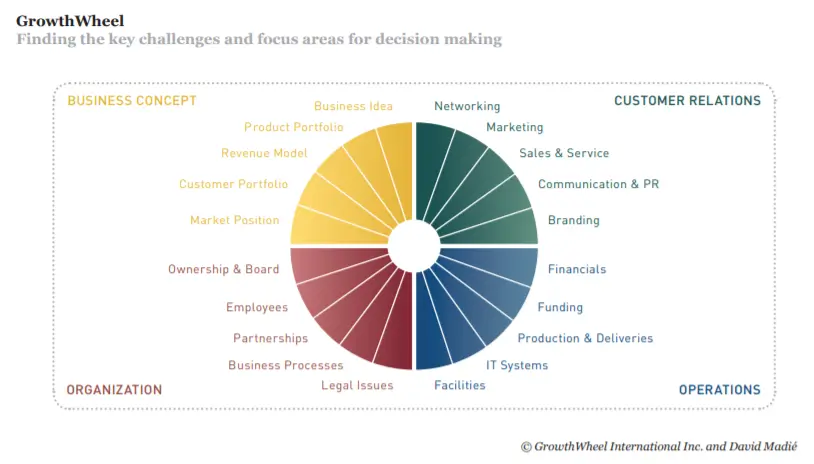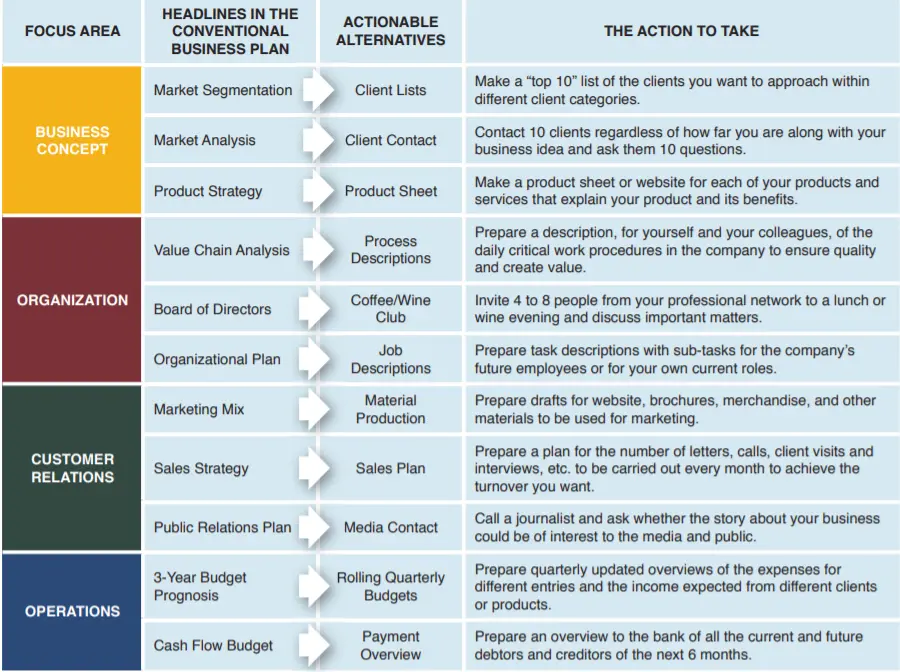
—Starting a company requires action
Focus Area: 360° Planning Version 1.8.5
As entrepreneurs, we are constantly expected to write business plans. However, if most of the successful entrepreneurs have never written one, why should we waste our time on them? Is there a viable alternative to the conventional business plan?
There are several reasons why many successful entrepreneurs never get around to writing a business plan. First of all, they lack the time, because they are too busy starting up and actually running the business. Secondly, they lack the motivation, because they feel that writing a business plan is not creative or stimulating and seems more like a hurdle than something that could strengthen the business.
Thirdly, a business plan is often not necessary to obtain financing, because business owners are able to persuade their banks or investors in other ways. Why then is the conventional business plan not really the best way to develop a business after all? There are three major problems with the conventional business plan: Area of focus, time wastage, and perceived need.
“The business plan simply does not provide a realistic picture of whether the proposed business will be successful.”
Area of focus
The first problem is that conventional business plans do not focus on the immediate and actual challenges facing a new business. The traditional business plan is based on longterm projections of 3-5 years, while startups need to focus on short-term projections of 3-5 months or possibly even 3-5 weeks. Where the business plan focuses on the growth stages of a business, startups need to concentrate on the initial stage of development.
The second part of this problem is that the conventional business plan is assumed to generate results, which is often not the case. Many business plans lie dormant in desk drawers and are intermittently replaced by updated plans, because, in the meantime, the entrepreneur has realized that things should be done differently and has taken advantage of opportunities as they arise. A business plan can easily become a fairytale about markets, customers, and products that have lost touch with the changeable reality of startups.
The third part of this problem is that business plans are strategically oriented, rather than operationally oriented. Many plans describe business strategies in great detail, but lack information on the specific actions and tasks necessary to implement these strategies.
“What characterizes successful entrepreneurs is that they do not just have a good idea and a good plan. They get things done.
Waste of time
Advocates of the business plan may object, that, “It never hurts to have a good plan.” However, it actually can. The greatest problem with the business plan is the amount of time spent on writing it. This can take up to a hundred hours or more, which is the equivalent of several weeks of work. In addition, you never really finish writing a business plan. There is always a bit more to analyze, add, and polish. This can paralyze the startup, as the entrepreneur’s focus and energy are wasted on weeks and months of planning, rather than spent on doing actual business. It is, of course, always possible to write a “mini business plan,” which is fine; the smaller the better! The worst part is not the time and energy spent on writing useless plans, but the time and energy not spent on developing and growing the business, acquiring funding, and increasing the overall chance for the business’s survival. So, if it is not useful to write business plans, why do so many entrepreneurs think and feel that they should?
Perceived need to write a business plan
The belief that the development of a business plan was necessary to start a business became especially popular during the dot-com era, where thousands of internet startups attempted to raise venture capital. Prior to the dot-com era, investors had traditionally financed the growth and internationalization phase of an existing business rather than the startup phase. This is also the case today; however, many entrepreneurs still believe that they can raise capital for their new and untested ideas by writing business plans. An additional reason for the prevalence of the business plan is the introduction of entrepreneurship into further education curricula.
Business schools, in particular, have traditionally focused on the business plan as a central element of entrepreneurial courses, because they allow for academic expertise, including in-depth analyses of a company’s market position, business processes, value chains and other aspects of strategic planning. This is, however, more relevant to larger established companies than it is to startups. Many entrepreneurial consultants also consider the business plan a central tool and encourage entrepreneurs to write one. This allows consultants to provide advice with ease and to be in extensive contact with their clients, since there are endless opportunities to examine, elaborate on or discuss.
The financial sector often puts additional pressure on businesses to write a conventional business plan. Although banks have fortunately gained more of an interest in entrepreneurs, they unfortunately and misguidedly assume that the conventional business plan is the best means of evaluating an entrepreneurial venture. Therefore, the business plan is often a requirement for being considered for loan approval. Despite the prevalence of this practice, the business plan can at best provide the bank with a sense of false security.
The business plan is just not an indicator of whether a startup will become successful or not, and cannot determine whether you are the right person to make the business succeed. Furthermore, banks are not designed to take big risks. They exist to finance operations, which include loans to purchase assets and finance inventory or outstanding debt; therefore, a comprehensive evaluation of a startup’s cash flow over the next several months is more relevant to the bank than an in-depth written document, citing all the long term plans for the business. In a meeting, a bank representative will be convinced by the results one can show. They lend money to people, not companies. If entrepreneurs write business plans as a means of acquiring funding, they will become distracted from doing what actually needs to be done in order to achieve success.
The alternative
The alternative to the business plan is to start a business, rather than write about it. It is really about focusing on what will actually make a difference to the business – and thereby also to banks and investors. This could include a good sales presentation, a website, media coverage, a good overview of finances, or commissioned client sales and a good team of owners and employees in the company. When these elements are in place, it is completely unnecessary to document what your ideas are. It is done. For every heading in a conventional business plan, it is possible to take action instead that will take the business furthermore effectively. Rather than formulate a product strategy, one could develop the product series that will eventually be given to a client.
Rather than communication plans, you could formulate sales letters to different clients. These would still encompass the essence of your key message. The point is that by producing material that can be used in daily situations, real results are being produced as well as effective documentation for those, who require something in writing. The bank would prefer a finished website to plans for a website. The table on the next page provides examples of actions that an entrepreneur can take instead of writing a business plan.
GrowthWheel as a map
If you have ever tried to write a business plan, it was probably in an attempt to achieve an overview of all the tasks facing the business, regardless of whether you were in the startup or growth stage. An overview is certainly necessary. GrowthWheel (see illustration) is a map of all the Focus Areas that we must cover as entrepreneurs, divided into four, color-coded main categories. Two areas focus on the market; the business concept (yellow) and client relations (green). Two areas focus on organization; organization (red) and operations (blue).

Another way in which GrowthWheel divides tasks is by distinguishing between tasks relating to how we design (left side) and tasks relating to how we further develop (right side). The philosophy behind GrowthWheel is that we, as entrepreneurs, are not able to manage all business areas at once. This is also why it is hopeless and unnecessary to try to plan everything beforehand. It is better to take one step at a time, using GrowthWheel as a compass to find the next step necessary to move the business forward. GrowthWheel also tells us that we do not have all the skills necessary to develop the business. That is why we must try to find others to help us in certain areas, for example business partners, employees or suppliers.

Startups require action
Starting a business is like playing the violin. We cannot learn through reading and writing. We have to play and through continuous practice and trial and error become better and ultimately proficient. Entrepreneurs have always started businesses without a business plan. However, they have never done so without thinking and acting. What characterizes successful entrepreneurs is that they do not just have a good idea and a good plan. They get things done.
Suggestions for the next step
• Get an overview of all the business Focus Areas and all the tasks requiring your time.
• Assess in which areas to act to achieve the greatest possible change.
• Plan your next step for each of the Focus Areas.
Please reach out to clientservices@tenntalk.org to learn more about our GrowthWheel Business Advising Program.
© GrowthWheel International Inc. and David Madié





















